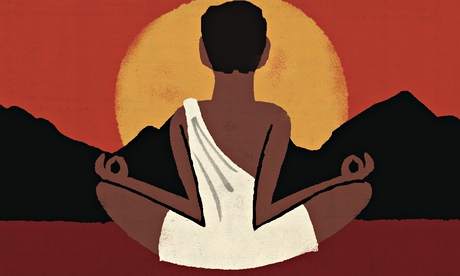
It’s been reported that 20% of British people and 25% of Americans describe themselves as “spiritual but not religious”. The others probably rolled their eyes and muttered, “Oh, please.” It’s a maddening phrase, exuding both smug superiority (“I’m deeper than an atheist but smarter than a believer!”) and new age credulity of the wind-chimes-cure-cancer variety. Yet it’s how I’d reluctantly describe myself. So it’s jolting to learn that Sam Harris, the celebrity atheist – much of whose work I think is wrongheaded – is one of us, too. While denouncing religion in public, it turns out Harris spent years studying with gurus in India, going on meditation retreats, and using mind-expanding drugs to feel boundlessly at one with the universe. His new book, Waking Up, makes a powerful case that there’s no contradiction here – and that it’s time for rationalists who think “spirituality” is a meaningless term to get over themselves. Pretty much literally, in fact.
What Harris means by spirituality stems from the realisation that the feeling of being a distinct self – “the sense of being perched somewhere behind your eyes, looking out at a world that is separate from you” – is an illusion, and can be altered, even extinguished. Meditation and magic mushrooms are among the ways of achieving that. But why bother? Because not realising this truth is what keeps us trapped in the endless quest to acquire the things we think will make us happy: relationships, money, power. That quest locates happiness in the future, yet “the reality of your life is always now”. Step out of the self, even briefly, and you step into the present – and a kind of happiness that doesn’t depend on certain criteria being met. “Is it possible to be happy before anything happens, before one’s desires are gratified‚ in the very midst of physical pain, old age, disease and death?” Harris’s answer is yes.
This is just Buddhism 101. But Harris’s unique contribution is in showing that it gives atheists nothing to fear. The problem with religion isn’t that its followers have spiritual experiences; rather, it’s the beliefs they form as a result. And isn’t it a problem for the forces of reason that “if someone wakes up tomorrow feeling boundless love for all sentient beings”, the only groups to take him or her seriously will be religions or cults? Yet Harris is equally firm that he’s not using “spirituality” as a fancy synonym for wonder – for “awe at the beauty of the night sky”, as some scientists do. It’s a far more basic shift in one’s experience of reality. And meditation needn’t be thought of as some far-out practice; it’s just a way of being present. You could even argue it’s not meditating that’s weird.
Personally, I’d go further: I think many of the western religious traditions Harris scorns are also, above all, collections of rituals for returning attention to the present. (As Karen Armstrong has shown, for most of history, religious people would have been baffled by questions such as, “Does God exist?” Religion was mostly about practice, not belief.) But the essence of his argument stands. And if stepping out of selfhood means anything, in my case it surely means letting go, temporarily at least, of my ego-driven sniping at Sam Harris.
oliver.burkeman@theguardian.com
Follow Oliver on Twitter

